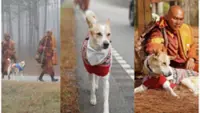Many pet owners brought their well-groomed dogs that wore cute collars and costumes to the AKC Pawsitive Fiesta. — Photos: AZLINA ABDULLAH/The Star
Successful trap-neuter-return programme in Penang leads group to pilot project in Selangor
HUMANE methods and responsible pet ownership are the best way to tackle the stray population problem, according to a stray animal advocate.
Animal Kindness Coalition (AKC) president Asther Lau said the trap-neuter-return (TNR) programme in Penang Island was a good model.
She said the Penang Island City Council signed a memorandum of understanding with the International Aid for the Protection and Welfare of Animals to adopt the TNR approach six years ago.
“Since then, over 6,000 stray dogs have been neutered and there are not many stray dogs anymore.
“There’ll be teething issues along the way, as with any new project, but we have to start somewhere.
“Otherwise, the stray population will continue to grow, creating a very unhappy and unhealthy environment for both animals and humans,” she said at the launch of AKC Pawsitive Fiesta.
The Pawsitive Fiesta was to create awareness of responsible pet ownership.
It was held at The Rivercity in Kuala Lumpur, one of the latest developments that is being enhanced to become pet-friendly.
Lau said AKC members were animal lovers, with many having been involved in TNR efforts for many years.
These volunteers have rescued hundreds of dogs and cats off the streets, she said, with many doing it in their respective neighbourhoods.
“We believe that the strays on our streets deserve better lives. They are struggling, constantly searching for their next meal and trying to find a place to rest, only to be chased away.
“We don’t want these animals to be caught and euthanised without mercy.
“It’s not just about reducing numbers; it’s about giving these animals a chance to live with dignity,” Lau stressed.
AKC was registered in July last year.
“One of our main projects started last December, which was to implement trap-neuter-return-manage (TNRM) programmes in Bandar Utama, Selangor, after the Petaling Jaya City Council (MBPJ) approved the pilot project.
“We have achieved a 90% TNR rate,” said Lau.
She said management, was critical for long-term success of TNRM programmes.
Besides neutering, she said the group also vaccinated strays against diseases such as rabies.
She said it was essential to curb stray reproduction before releasing the animals back to their original territory.
“We engage with feeders and local communities, work with local authorities and collaborate with corporations.
“This ensures we tackle the issue from its root and achieve sustainable results.
“We also recognise the importance of other aspects of animal welfare, like having a temporary shelter that facilitates animal adoption.
“It is about nurturing responsible pet ownership within our community,” said Lau.
She said these events were a platform to encourage pet ownership culture where the community takes care of each other and the environment.
The two-day Pawsitive Fiesta, which attracted several hundred pet lovers, featured a range of activities aimed at engaging the community and promoting responsible pet ownership.
There was a pet adoption drive, demonstration by the police with three dogs from the K-9 unit, and sharing sessions by professional pet trainers and groomers.
There were also many booths selling a variety of pet products.








